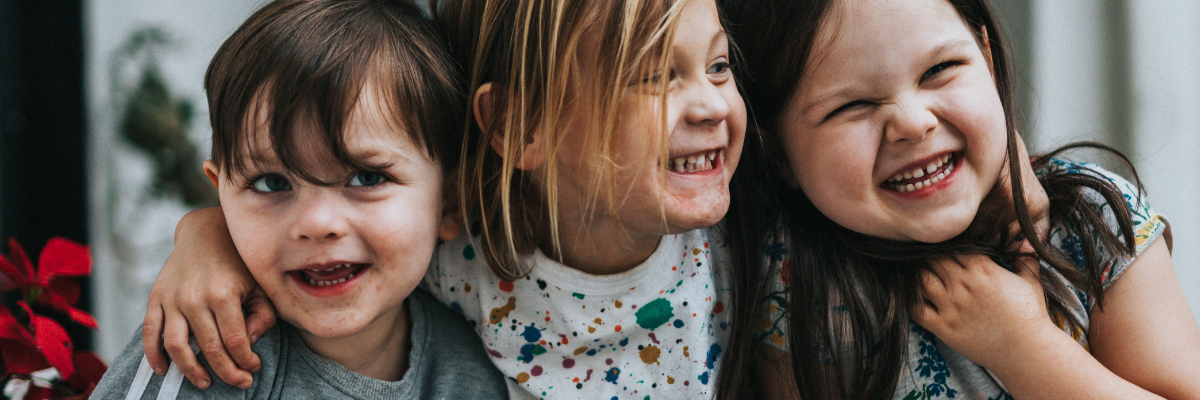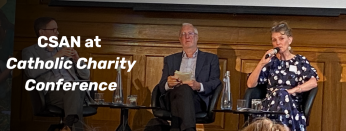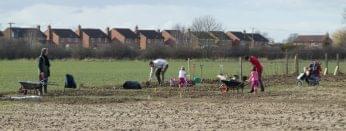The Catholic Union and Caritas Social Action Network (CSAN) have called for children and families to be the focus of the Chancellor’s Autumn Statement on Wednesday 22 November.
The two groups have called on the Chancellor, Jeremy Hunt, to consider changes to the benefit system to help families with the cost of living. These include increasing the rate of child benefit, scraping the two-child cap on Universal Credit and Working Tax Credits, and lifting the High Income Child Benefit Charge.
In their joint representation to the Treasury, they focus on lifting the two-child cap on benefits. The policy, introduced in 2017, limits the childcare element of Universal Credit and Working Tax Credits to the first two children. It has been strongly opposed by the Catholic Church and charities since its introduction.
The groups highlight the latest assessment of the two-child cap, published by the University of York, which found that the policy had “a negative impact on people’s mental health, increasing stress and anxiety, and harming their well-being, with knock-on effects on children’s opportunities and wellbeing.” They also highlight firsthand experience from CSAN members, including Caritas Salford.
Catholic Union Director, Nigel Parker, comments:
“The increase in the cost of living has stress tested our benefits system, and it has been found wanting for many families. The impact of decisions made over the past 10 years are beginning to be seen firsthand, especially in relation to support for children. At a time when so many families are struggling, it is important that the Church continues to speak out on policies such as the two-child cap. We are pleased to have made this joint submission with CSAN as we continue our work to make the tax and benefit system fairer for families.”
CSAN Chief Executive, Raymond Friel OBE, comments:
“At a time of growing economic strain on families, Caritas Social Action Network and the Catholic Union of Great Britain, in line with the Catholic Bishop’s Conference of England and Wales Department of Social Justice’s statement on the Cost of Living crisis in Autumn 2022, are steadfast in our commitment to advocating for vulnerable children and families. Through our joint submission, we call on the Chancellor to keep children and families at the forefront of the Autumn Statement 2023, urging the government to lift the two-child cap and implement fairer benefit systems that will work to alleviate child poverty and help families to flourish in this time of crisis.”
More information on the Autumn Statement can be found here: https://www.gov.uk/government/news/autumn-statement-2023-date-confirmed
Joint submission to HM Treasury ahead of the Autumn Statement 2023
From the Catholic Union of Great Britain and Caritas Social Action Network (CSAN)
- The Catholic Union of Great Britain and Caritas Social Action Network (CSAN) welcome the opportunity to make a submission to HM Treasury ahead of the Autumn Statement 2023.
- The Catholic Union is a membership organisation that seeks to promote the interests and concerns of the 4.5 million Catholics in Britain and advance the common good.
- CSAN is an agency of the Catholic Bishops’ Conference of England and Wales, with 54 charities in membership committed to social action and providing professional and voluntary assistance to people of all faiths and none: to families, refugees, asylum seekers, older people, vulnerable adults, the homeless, prisoners, and the unemployed.
- Our organisations are both concerned with putting Catholic Social Teaching into practice. Part of this teaching includes care for the poor and marginalised in society, as well as a deep concern for children and family life and creating a society where they can flourish.
- CSAN has a particular role in meeting the needs of people in society through animating and convening the work of its member charities. Many of these charities have seen first-hand the changes that have been made to the benefits system over the past decade, including the “benefit cap” which was introduced in 2013.
- The Catholic Union has a particular role in promoting Catholic Social Teaching in public life. We have made written submissions ahead of previous fiscal events, including at the Budget earlier this year where we called for a Commission on Family Taxation to be set up.
- In this joint submission, we call on the Chancellor to focus on children and families ahead of the Autumn Statement on 22 November 2023. Given the continued challenges faced by household budgets because of inflation and rising energy costs, the Government must ensure that there a focus on making sure more children do not end up in poverty.
- Measures such as increasing child benefit, scraping the two-child cap on Universal Credit and Working Tax Credits, and lifting the High Income Child Benefit Charge, would all go some way to support children and families with the cost of living. For the purposes of this submission, we will limit our comments to the two-child cap, which both of our organisations have opposed since it was first introduced in 2017.
- It is also a policy which is opposed by the Catholic Bishops’ Conference of England and Wales. The Bishop of Northampton, David Oakley, said in a recent comment that: “At a time of ever-growing social and economic insecurity for families across England, the two-child cap on universal credit places an unnecessary and disproportionate burden on households, particularly for families that have suffered the pain of unemployment or disability”.[i]
- The latest government figures show that 1.5 million children live in families affected by the two-child cap, meaning the policy now reaches more than one in ten children in the United Kingdom.[ii] These families are missing out on up to £3,235 a year.[iii]
- The Child Poverty Action Group states that “Abolishing the two-child limit is the most cost-effective way of reducing child poverty – it would lift 250,000 children out of poverty, and a further 850,000 children would be in less deep poverty at a cost of just £1.3 billion.”[iv] Further, Save the Children highlight that child poverty is estimated to cost the UK government £39 billion a year.[v] This investment will undoubtedly help to save public money in the long term.
- In Parliament, the House of Commons Work and Pensions Select Committee has published two reports on the two-child cap recently – in January 2019 and November 2019. In its second report, the Committee recommended scrapping the two-child limit, observing that the policy “not only fails to achieve the Government’s own objectives but has evident, unintended consequences that no Government should be willing to accept.”[vi]
- In April 2022, a House of Commons Research Briefing noted that: “The Committee [Work and Pensions Select Committee] had seen no evidence that the two-child limit was working in the way the Government hoped for, not least because the Government itself had produced no evaluation.”[vii]
- The most recent independent assessment of the two-child cap was carried out by the University of York in a study funded by the Nuffield Trust. The report, published in July 2023, found that the policy had a “negative impact on people’s mental health, increasing stress and anxiety, and harming their well-being, with knock-on effects on children’s opportunities and wellbeing.”[viii]
- The University of York study confirmed that the policy has a disproportionate impact on certain households, including: “larger families and renting households – which in turn means they disproportionately affect minority ethnic households, and those less able to increase their income through employment, including single parents and families with younger children.”[ix]
- The study also found that of the families interviewed, “many did not know the two-child limit existed until after their child was born, often because they were not receiving benefits at the time of birth, only needing support later after circumstances changed”.[x]
- These results confirmed what had been previously found in a study carried out by the London School of Economics (LSE), also funded by the Nuffield Trust. The study found that “the two-child limit had a measurable, but relatively small, impact on the number of births to affected families; the probability of having a third or subsequent child declined by 0.36 percentage points (or 5 percent) after the limit was introduced.”[xi]
- The results from the University of York and LSE studies have been seen first-hand by some charities in the CSAN family who are working to meet the needs of people across the country. Caritas agencies in the diocese of Salford and Shrewsbury have seen families coming forward to ask for the most basic essentials like shampoo because they cannot afford them, and they are less available in food banks. They are meeting parents who are regularly foregoing meals to enable their youngest family members to eat instead.
- Further, Caritas Salford reports that evidence from their counselling service that works with children experiencing poverty, highlights that these children are acutely aware of the financial challenges facing their parents, causing avoidable and unnecessary anxiety in their early years. Whilst their services do work with parents to help them organise their resources, they are also finding it necessary to support parents to try and safeguard the mental health, security, and well-being of their children in the face of crippling poverty.
- It is abundantly clear that the increases in the cost of living have been made worse for some households by a benefits system that fails to provide all children and families with the support they need. As we approach a General Election, this is likely to be one of the last fiscal events for this Government to make changes to the system.
- We urge the Chancellor to take note of this submission and put children and families at the heart of his Autumn Statement 2023.
[i] https://www.cbcew.org.uk/bishop-oakley-universal-credit-two-child-limit
[ii] https://www.cambridge.org/core/journals/journal-of-social-policy/article/time-of-need-exploring-the-changing-poverty-risk-facing-larger-families-in-the-uk/2512B738E12FC27BDF301472623FCE3E
[iii] https://cpag.org.uk/policy-and-campaigns/briefing/six-years-two-child-limit
[iv] https://cpag.org.uk/policy-and-campaigns/briefing/six-years-two-child-limit [iv]
[v] https://www.savethechildren.org.uk/blogs/2023/scrapping-the-two-child-limit-is-the-most-cost-effective-way-of-
[vi] https://committees.parliament.uk/committee/164/work-and-pensions-committee/news/97851/two-child-limit-report-published-17-19/
[vii] www.commonslibrary.parliament.uk/research-briefings/cbp-9301/
[viii] https://largerfamilies.study/publications/needs-and-entitlements/
[ix] https://largerfamilies.study/publications/needs-and-entitlements/
[x] https://largerfamilies.study/publications/needs-and-entitlements/
[xi] https://www.lse.ac.uk/News/Latest-news-from-LSE/2022/d-Apr-22/Two-child-benefit-limit







